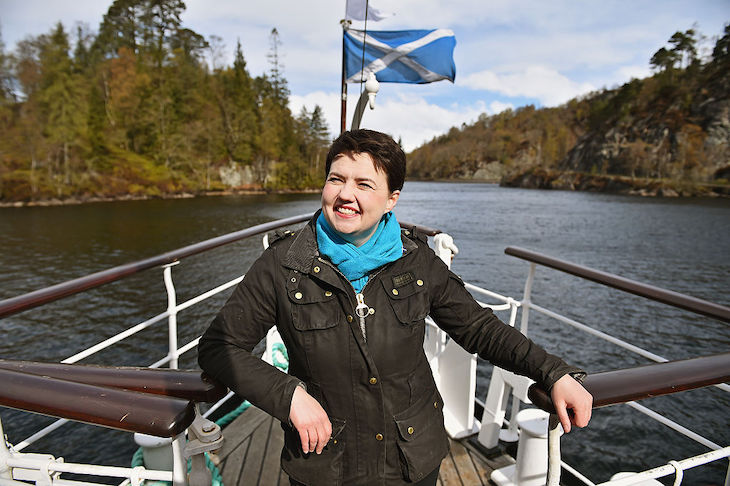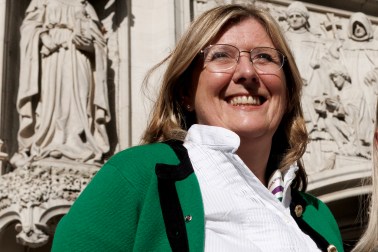Ruth Davidson is on the brink of resigning as leader of the Scottish Conservative and Unionist party. As I write this, party sources are making it clear there will be no statement on her future this evening. The absence of an immediate, dismissive, denial, gives greater credence to the suggestion that she will resign soon.
Not everything is about Brexit and this is one of these things that is not entirely about Brexit. For some weeks now Davidson’s future has been the matter of some whispering at Holyrood. Very quiet whispers but whispers nonetheless. Earlier this summer one of her closer colleagues speculated to me about her future. Ruth wasn’t at the top of her game, he said, and worse her heart didn’t seem to be in it either. There was something afoot, something tired and even lacklustre about her. The Scottish Tories as a whole were becalmed and lacking in energy, ideas, and purpose. The idea Davidson might become first minister following the 2021 elections had been quietly dropped; the party was not behaving like a party that was getting ready to prepare for life in government. How much longer did Ruth want to remain as leader?
So if she resigns it is both a surprise and something less than a complete shock. Life changes and comes at you fast when you’re a new mother. Juggling political leadership with motherhood is neither simple nor straightforward. Davidson, like many new mothers, has been reevaluating her priorities in recent months. And sometimes, some things have to give. That’s not the only or even the dominant reason for her resignation but it is part of the reason.
Brexit, however, has hardly helped. It was not just that Davidson was a committed Remainer three years ago, it was that, like so many others, she expected that a vote to Leave would lead to a managed Brexit departure in which as many of the advantages of EU membership were retained as could reasonably be deemed possible. That, to put it mildly, is not how matters have transpired.
Time and time again Davidson has been forced to defend choices she thinks wholly regrettable and ultimately undesirable. There is a difference between accepting the referendum result and accepting every interpretation of it. There comes a point when doing so strips you of your political dignity; a point at which going along with it or being a good soldier becomes counter-productive. You can live like this, even in politics, but is it really worth doing so?
That Davidson and Boris Johnson have a terrible relationship is neither a secret nor quite the point. It doesn’t help, but the fact Davidson considers the prime minister a **** is not, on its own, enough to force her out. But again, it hardly helps. And, to be clear, she doesn’t think the prime minister a ****, she considers him a ****.
Even so, and despite all of the above, I had thought she would grin and bear it, sticking matters out until the 2021 Holyrood elections. As matters stand these are likely to be a proxy-referendum on the question of whether or not there ought to be another referendum on independence. A pro-Yes majority in the next Scottish parliament is likely to lead to a second plebiscite. Denying the SNP that victory was Davidson’s chief remaining goal in politics. Her mission was, as she once put it, ‘to bury this s**** for a decade’. With the SNP stymied, although probably still in office in Edinburgh, she could have been forgiven for thinking she had done her bit and finished her shift. A decade as leader would be enough.
Events next year may yet weaken the SNP. The nationalists’ chances of victory in 2021 are imperilled by the fact they will by then have spent 14 years in power but, right now, Davidson’s departure is a boon to the independence cause and a grievous blow to Unionism.
At its simplest, when you boil everything down to the real truth, without Ruth Davidson the Scottish Tories would most likely still be nowhere. When the party came second in the 2016 Holyrood election they did so on the back of a campaign that was, in essence, all about Ruth, the whole Ruth and nothing but the Ruth. Someone had to stand up to the SNP, and in the absence of anyone from Scottish Labour wishing to or capable of doing so, it fell to the Scottish Tories to be the watchers on the wall, the last true believers in and defenders of the Union.
And it worked. In 2011, the Scottish Tories won 276,000 votes and in 2016 they won more than half a million. That pattern was repeated in the 2017 general election in which the Tories captured a dozen new seats north of the border. In 2015, the year of the SNP tsunami, the Tories won 450,000 votes and in 2017 they took more than three quarters of a million.
Hence this irony: Ruth Davidson’s success was made possible by her opponents and her demise has been brought about by her erstwhile friends and colleagues. She is a victim of both Brexit and the UK Conservative party’s undeniable shift to the right. Poll after poll of English Tories has shown the weakness of Unionism south of the border. As a matter of sentiment it’s not something that matters as much as once it did. Brexit is more important than Union in England whereas in Scotland, generally speaking, Union is more important than Brexit. Politics, as we all know, is the language of priorities.
That has left Scottish Unionists wondering if they’re actually the last true believers in an old-time religion that’s suddenly become deeply unfashionable. They worry, with increasing reason, that they have been abandoned by people they mistakenly considered their co-religionists. To put it another way, a UK Tory party that always thought about the interests of Unionism and considered them important would not have behaved in the way this UK Tory party has these past three years.
Inevitably, one of the next questions for the Scottish Tories is an old one. Should they remain part of the UK party or instead declare their independence and start afresh as a new and distinct party? This was the idea proposed by Murdo Fraser when he and Davidson fought for the leadership in 2011. Some 45 per cent of those Scottish Tories who voted in that election opted for Fraser’s Dignitas proposal. Davidson, however, was always clear she thought this a counsel of despair. And besides, she argued, who would really be persuaded by this new party?
The argument has not disappeared, however, and as recently as a few weeks ago Davidson once again declared her opposition to it. A revivified UK needs more pan-UK institutions, not fewer. It wasn’t something that would happen on her watch.
Now it seems as though her watch is ending and so the question will arise once again. There are plenty of Davidson’s Holyrood colleagues who think the party’s identity problem places a ceiling on the party’s prospects in Scotland. The association with a UK party that, viewed from Scotland, seems increasingly barmy and evermore toxic has not helped. Davidson’s successes have been in spite of her colleagues in government, not assisted by them.
How quickly a political star can fade, however. It is not so very long since people talked of Davidson as a bright new talent whose abilities were ill-served by being confined to the Scottish stage. A career at Westminster surely beckoned. A place in the Cabinet was certain. Perhaps she might even lead the party and be prime minister too.
Much of this was overly-excitable commentary and based on a hefty quantity of wishful thinking. It ignored the structural and personal hurdles that needed to be overcome to make any of it a reality. Even so, it was a mark of how a different kind of Tory could at least appear to offer something different. But then as more than one Scottish cynic suggested, no politician was ever half as good as the Ruth Davidson some people imagined they could see. Her unavailability only made her more desirable.
Davidson’s Toryism was easily misunderstood in any case. Biography is not everything but even when it is something people concentrated on the wrong parts of Davidson’s story. That she’s a lesbian is much less important than her service in the army reserves and her belief in the god worshipped by the Church of Scotland. She is genuinely liberal on some matters – immigration being one – while being a traditional Tory on others, notably crime and punishment. That, though, was the point: she hinted at a new but genuine form of fusionism, marrying some of the preoccupations of the metropolitan classes with those of a more antique, rustic, brand of Conservatism.
Well, that song’s over now too. After Ruth, who? There are no obvious or immediately compelling candidates. But even though that is palpably the case it is worth recalling that Ruth Davidson was not always Ruth Davidson either. Her first years as Tory leader were largely disappointing; it took her time to learn how to be a politician and time, too, to learn how to lead. She was in large part saved by Alex Salmond and Nicola Sturgeon. As soon as the constitution became the real, this-is-for-keeps, dividing line in Scottish politics Davidson had a tune to sing and one, moreover, in which she believed wholeheartedly. Her successes – and they were real – were part of Alex Salmond’s political legacy.
So perhaps another Ruth can arrive if and when the moment calls for him or her? Maybe so, but right now, here, this moment, that seems unlikely. Davidson possessed a rare ability to cut through the noise and reach voters who would not normally contemplate endorsing Tory candidates. Even many of those who could not stomach her party still had some respect, grudging or not, for Davidson. That’s a precious and uncommon gift that is not easily replaced.
If she goes she has been done in by her friends in the south. A no-deal Brexit, which will give the SNP’s political argument for independence a significant boost, is a concession too far. It is a fresh reminder too, if it were really needed, that the future of the United Kingdom as a going concern can be threatened in London as well as in Edinburgh or Glasgow. Scottish independence is not an issue likely to disappear soon and it turns out the United Kingdom can be lost, or at least jeopardised, on the playing fields of Eton.
Ultimately, Ruth Davidson could cope with the SNP. They were merely the opposition. Her enemies were to be found in what purported to be her own party and that, in the end, has proved too much.







Comments